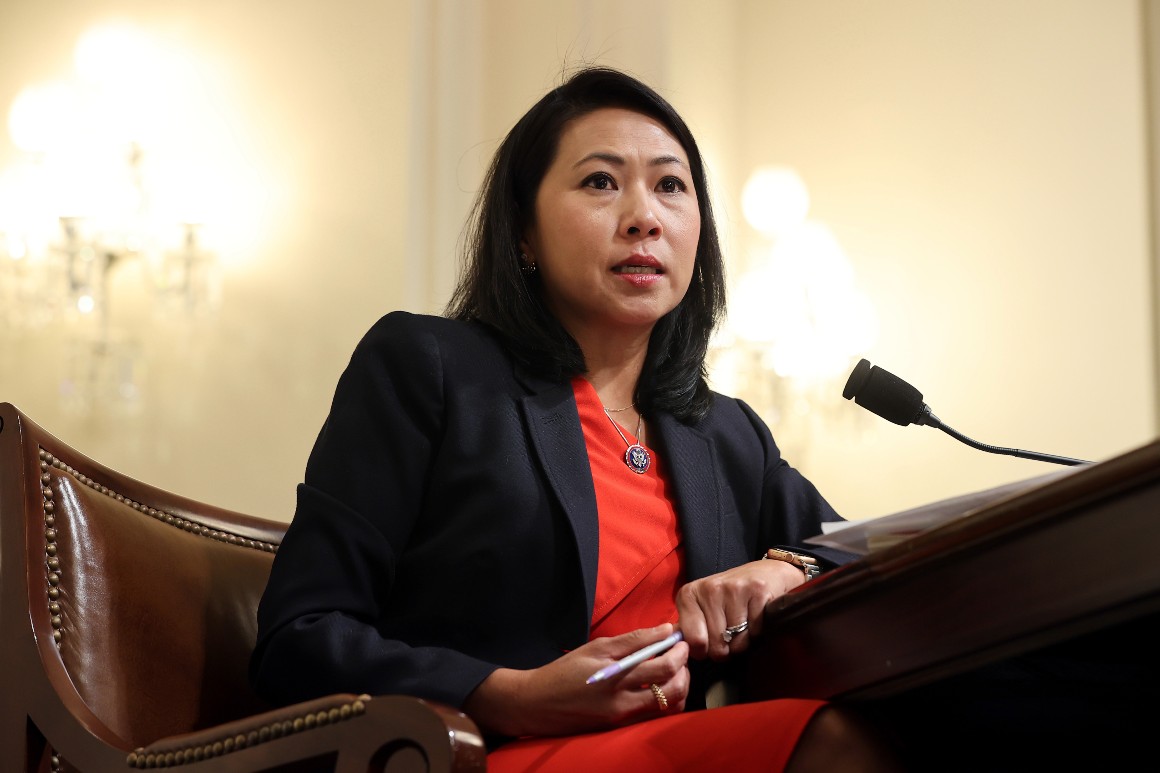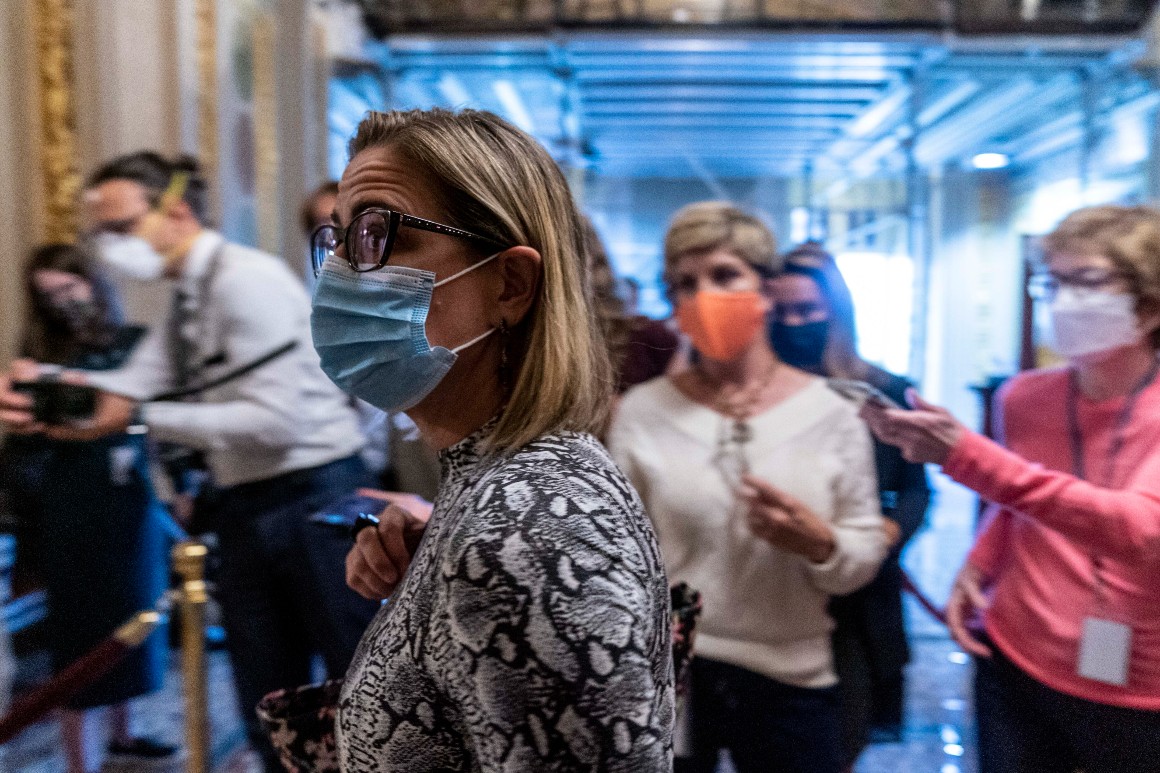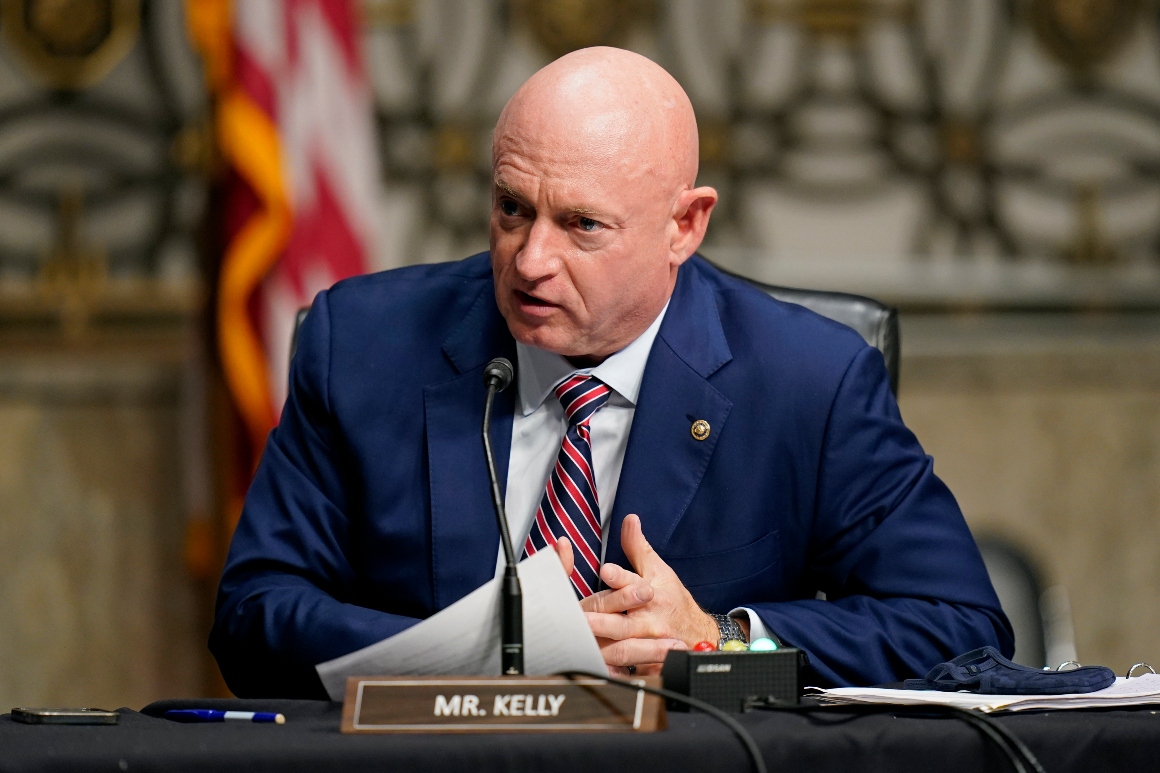
There’s a wide spectrum of Democratic-allied groups trying to cajole the party’s moderates into backing President Joe Biden’s major domestic spending proposal. Their approaches, though, have followed two vastly different tracks: There’s the honey and there’s the vinegar.
Progressive activists have adopted an aggressive, confrontational approach, epitomized by protesters following Sen. Kyrsten Sinema (D-Ariz.) into the bathroom and then traveling to Boston to hound her at the Monday marathon there, even though a foot injury kept her from running the actual race.

But climate and conservation groups as well as Building Back Together, the outside advocacy arm of the White House, have taken a different tack, pouring tens of millions of dollars in television ads running for months in battleground districts, which are largely positive in tone. Some Democrats, like Florida’s Rep. Stephanie Murphy, have yet to sign onto Biden’s full reconciliation plan. But the climate ads running in her Orlando-area district haven’t accused her of forsaking the planet in a time of need. Instead, they’ve highlighted past statements she’s made supporting more resources to battle climate change, before emphasizing the urgent need to pass Biden’s broader proposal.
The different tactics underscore the divide within the party over how to move the president’s agenda over the finish line. The $3.5 trillion spending outline, which calls for more resources for climate, early education and pre-K programs, among other social spending initiatives, has been cheered as transformational by progressives, who also argue that they’ve compromised already by backing off desires to spend even more.
But is has so far drawn deep skepticism from frontline House Democrats and moderates who have urged Biden to first advance a bipartisan infrastructure deal that has already passed in the Senate, and have raised concerns that their districts would not support what were viewed as progressive initiatives in the larger social spending package.
To advance his agenda, Biden needs to broker a deal with both sides of his party, and has acknowledged that the overall spending will be far less than his initial $3.5 trillion topline. And as the Oct. 31 informal deadline for moving this bill and the infrastructure package nears, spending around them is piling up.
Since May 1, outside groups — from both the left and the right — have spent more than $54 million in TV advertising either promoting Biden’s spending plan or tearing it down, according to AdImpact, an advertising analytics firm.
“It is an opportunity to elevate or highlight for those members just how critical it is that they seize the moment,” said Pete Maysmith, senior vice president of campaigns for the League of Conservation Voters, which has run ads encouraging Democrats in swing districts to vote for the social spending package. “There won’t be another opportunity to act at the scale that science and justice demand.”
One of the top spenders is Build Back Together, which says it has plowed $15 million into paid media supporting Biden’s overall economic agenda, which began with the $1.9 trillion Covid relief funding package that passed in the spring. Despite jittery moderates who fear the size of the reconciliation package, BBT contends that its own polling shows voters are more likely to support lawmakers at the ballot box if they back the bill.
“We’re making the case directly to the American people about what's in these plans: creating millions of good-paying jobs, lowering household costs, and forcing the ultra-wealthy to pay their fair share, while giving members of Congress the support they need and urging them to keep fighting for their constituents and get this done,” said Sharon Yang, national spokesperson at Building Back Together.
That message is in sharp contrast to activist groups, like Our Revolution, who refer to moderates who have not supported the $3.5 trillion agenda as “corporate Democrats.”
Our Revolution notes that, like many supporters of Sen. Bernie Sanders (I-Vt.), they were long dismissed for supporting a fringe set of issues. Now their agenda is being echoed by the president’s agenda.
“What’s shocking is progressive and party leadership are more or less aligned — that's a new phenomenon,” Our Revolution Executive Director Joseph Geevarghese said in an interview.
Geevarghese outlined a much harder line his group planned to take against moderates who didn’t sign onto Biden’s agenda.
“I think that includes keeping a list and seeing where people end up and being willing to primary people if necessary,” he said.
BBT, meantime, has also surged its own ad spending to combat messaging from Republican-aligned groups, which are attacking both Biden’s plan and at-risk Democrats. One ad, paid for by Club for Growth, tells viewers to call Nevada Democratic Rep. Susie Lee and oppose “new tax hikes, trillions and more spending and another Socialist healthcare plan.”
One of the top targets, Carolyn Bourdeaux, a Democrat in Georgia's 7th congressional district, has seen more than $2.7 million in TV ads spent since May, including one from the conservative Common Sense Leadership Fund that encourages constituents to call on Bourdeaux to stop what it characterizes as a liberal spending spree in Washington. BBT countered with an ad saying CEOs and big Pharma were lying about Bourdeaux because they feared Biden was “making the wealthiest finally pay their fair share.”
Among the other top targets of ad spending are Democratic Reps. Cindy Axne of Iowa, Elissa Slotkin of Michigan and Jared Golden of Maine, according to AdImpact.
In the Senate, Sinema and fellow centrist Democrat Joe Manchin of West Virginia have been the main target of both activists’ ire and advocacy groups’ gentle pressure. BBT offered some honey in TV ads it ran in August, crediting the Arizona senator for helping pass the bipartisan infrastructure plan and saying she “delivered for us.”
They then gave her and her fellow Sen. Mark Kelly (D-Ariz.) a nudge.

“They pulled our economy back from the brink and now they're fighting to create millions of good paying jobs and lower the costs of healthcare, child care and prescription drugs,” the ad said, a clear reference to the spending bill the White House has yet to get over the goal line.
For the Democrat-aligned groups, it is a delicate balance between advocating for an issue and going so hard at incumbents that it places them in a weakened position in the 2022 midterms. The League of Conservation Voters, which is running a high volume of ads in Murphy’s district right now, managed to strike that balance, said a senior Democratic aide close to the moderate wing of the party.
“They're doing it in a very smart way, praising her on what she's standing up for climate-wise, and encouraging her to keep fighting,” the aide said. “They’re like positive ads but kind of pushing her in their direction. It’s a very smart way to do it.”
The strategy, said Climate Power Executive Director Lori Lodes, is to highlight to moderates and their districts that tackling climate change is an issue that voters support; not to demonize them for not yet supporting it themselves.
“Stephanie Murphy, Josh Gottheimer (D-NJ), Carolyn Bourdeaux — you are hearing all of these members who have made it clear that what they do support is climate,” Lodes said in an interview. “Not just progressives but that progressive and moderate, and everybody in between agrees that climate action, can't wait … Our ads are just distilling that part of it – what is driving popular policy and it is unifying the overwhelming majority of the party.”
----------------------------------------
By: Natasha Korecki
Title: Dems torn between wooing and badgering the Biden agenda holdouts
Sourced From: www.politico.com/news/2021/10/13/democrats-reconciliation-ads-biden-515865
Published Date: Wed, 13 Oct 2021 03:30:05 EST






